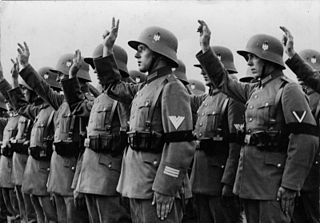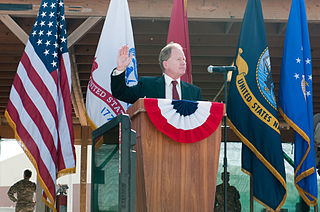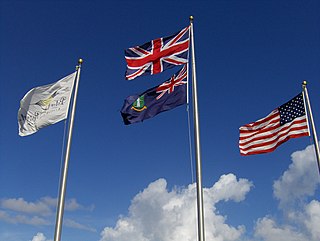 W
WAn oath of allegiance is an oath whereby a subject or citizen acknowledges a duty of allegiance and swears loyalty to monarch or country. In republics, modern oaths are sworn to the country in general, or to the country's constitution. For example, officials in the United States, a republic, take an oath of office that includes swearing allegiance to the United States Constitution. However, typically in a constitutional monarchy, such as in the United Kingdom, Australia and other Commonwealth realms, oaths are sworn to the monarch. Armed forces typically require a military oath.
 W
W21 & 22 Vict. c.48 was an 1858 Act of the UK Parliament which replaced three separate oaths of office with a single oath of allegiance to the British monarch. Besides an oath of allegiance, those holding public office had previously been required to take the Oath of Supremacy and the Oath of Abjuration.
 W
WThe Canadian Oath of Allegiance is a promise or declaration of fealty to the Canadian monarch, as personification of the Canadian state, taken, along with other specific oaths of office, by new occupants of various federal and provincial government offices, members of federal, provincial, and municipal police forces, members of the Canadian Armed Forces, and, in some provinces, all lawyers upon admission to the bar. The Oath of Allegiance also makes up the first portion of the Oath of Citizenship, the taking of which is a requirement of obtaining Canadian nationality.
 W
WThe Oath of Citizenship, or Citizenship Oath, is a statement recited and signed by those who apply to become citizens of Canada. Administered at a ceremony presided over by a designated official, the oath is a promise or declaration of fealty to the Canadian monarch and a promise to abide by Canada's laws and uphold the duties of a Canadian citizen; upon signing the oath, citizenship is granted to the applicant.
 W
WThe Coronation Oath Act 1688 is an Act of the Parliament of England. It was passed in 1689. The preamble noted that "by the Law and Ancient Usage of this Realm" the monarchs of England had taken a solemn oath at their coronation to maintain the statute laws and customs of the country and of its inhabitants, but the text of this oath had become partly meaningless over time, "framed in doubtful Words and Expressions with relation to ancient Laws and Constitutions at this time unknown". It established a single uniform oath to be taken by future monarchs at their coronation, and also established that this oath was to be taken by William III and Mary II when they were crowned. The oath was fundamentally different from the traditional coronation oath which recognized laws as being the grant of the King whereas the Act's oath sought to bind the King to rule according to the law agreed in parliament. The oath was shorter than the one used in 1660, removing a number of awkward phrases and references to past monarchs; a significant alteration was the explicit inclusion of an oath to maintain "the true Profession of the Gospel and the Protestant Reformed Religion Established by Law", rather than the somewhat more vague promise to "Protect and Defend the Bishops and Churches under [my] Government."
 W
WAn oath of fealty, from the Latin fidelitas (faithfulness), is a pledge of allegiance of one person to another.
 W
WThe Hitler Oath —also referred in English as the Soldier's Oath—refers to the oaths of allegiance, sworn by the officers and soldiers of the German Armed Forces and civil servants of Nazi Germany between the years 1934 and 1945. The oath pledged personal loyalty to Adolf Hitler in place of loyalty to the constitution of the country. Historians view the personal oath of the Third Reich as an important psychological element to obey orders for committing war crimes, atrocities, and genocide. During the Nuremberg trials, many German officers unsuccessfully attempted to use the oath as a defense against charges of war crimes and crimes against humanity.
 W
WThe Non-juring schism was a split in the established churches of England, Scotland and Ireland, following the deposition and exile of James II and VII in the 1688 Glorious Revolution. As a condition of office, clergy were required to swear allegiance to the ruling monarch; for various reasons, some refused to take the oath to his successors William III and Mary II. These became known as Non-juring, from the Latin verb iūrō, or jūrō, meaning "swear an oath".
 W
WThe Oath of Allegiance of 1606 was an oath requiring English Catholics to swear allegiance to James I over the Pope. It was adopted by Parliament the year after the Gunpowder Plot of 1605. The oath was proclaimed law on 22 June 1606; it was also called the Oath of Obedience. Whatever effect it had on the loyalty of his subjects, it caused an international controversy lasting a decade and more.
 W
WThe Oaths Act 1888 was an Act of the Parliament of the United Kingdom providing that all required oaths may be solemnly affirmed rather than sworn to God. The Act was the culmination of a campaign by the noted atheist and secularist MP Charles Bradlaugh to take his seat.
 W
WThe Oaths Act 1978 is an Act of the Parliament of the United Kingdom.
 W
WVarious organisations in Nazi Germany required their members to swear oaths to Adolf Hitler by name, rather than to the German state or an officeholder. Such oaths were intended to increase personal loyalty to Hitler and prevent dissent. The Hitler oath, introduced for all members of the Wehrmacht and civil servants in 1934, was one such oath. Others were sworn by members of organisations such as the Schutzstaffel (SS), whose oath may have inspired the Hitler oath, and by the Hitler Youth.
 W
WThe Pledge of Allegiance to the Korean Flag is the pledge to the national flag of South Korea. The pledge is recited at flag ceremonies immediately before the South Korean national anthem.
 W
WThe Protestation of 1641 was an attempt to avert the English Civil War. In July 1641 Parliament passed a bill on 3 May requiring those over the age of 18 to sign the Protestation, an oath of allegiance to King Charles I and the Church of England, as a way to reduce the tensions across the realm. Signing them was a necessity in order to hold public office. Those that were not willing to sign it were also listed under it as refusing to pledge its oath.
 W
WThe Rütlischwur is the legendary oath taken at the foundation of the Old Swiss Confederacy by the representatives of the three founding cantons, Uri, Schwyz and Unterwalden, traditionally dated to 1291. It is named after the site of the oath taking, the Rütli, a meadow above Lake Uri near Seelisberg. Recorded in Swiss historiography from the 15th century, the oath is notably featured in the play William Tell by Friedrich Schiller (1804).
 W
WThe Schwurhand is a heraldic charge depicting the hand gesture that is used in Germanic Europe and neighboring countries, when swearing an oath in court, in office or in swearing-in. The right hand is raised, with the index finger and middle finger extended upwards; the last two digits are curled downwards against the palm. The thumb is shown slightly curled or raised.
 W
WThe Singapore National Pledge is an oath of allegiance to Singapore. It is commonly recited by Singaporeans in unison at public events, especially in schools, in the Singapore Armed Forces and during the National Day Parade.
 W
WThe Oath of Allegiance is a promise to be loyal to the British monarch, and his or her heirs and successors, sworn by certain public servants in the United Kingdom, and also by newly naturalised subjects in citizenship ceremonies. The current standard wording of the oath of allegiance is set out in the Promissory Oaths Act 1868.
 W
WThe Oath of Allegiance of the United States is the official oath of allegiance that must be taken and subscribed by every lawful permanent resident (LPR) who wishes to become a national of the United States (American). The only LPR who cannot take this oath of allegiance is one who is "removable" from the United States under the Immigration and Nationality Act (INA).
 W
WThe Pledge of Allegiance of the United States is an expression of allegiance to the flag of the United States and the republic of the United States of America. Such a pledge was first composed, with a text different from the one used at present, by Captain George Thatcher Balch, a Union Army Officer during the Civil War and later a teacher of patriotism in New York City schools. The form of the pledge used today was largely devised by Francis Bellamy in 1892, and formally adopted by Congress as the pledge 50 years later, in 1942. The official name of The Pledge of Allegiance was adopted in 1945. The most recent alteration of its wording came on Flag Day in 1954, when the words "under God" were added.
 W
WThe Virgin Islands pledge is a pledge of allegiance to the Virgin Islands, a British overseas territory. It was officially adopted by the territory's House of Assembly on 23 June 2016. It's intended to be commonly recited by Virgin Islanders in unison at public events, especially in schools, and during public celebrations. The pledge was first publicly recited on 1 July 2016 at Territory Day celebrations by Premier Dr. D. Orlando Smith and members of the government. The pledge reads: I pledge to my country, the Territory of the Virgin Islands, to encourage national pride and dignity, render patriotic service, promote justice for all, be true to God and remain dedicated to these Virgin Islands.
 W
WBekenntnis der Professoren an den Universitäten und Hochschulen zu Adolf Hitler und dem nationalsozialistischen Staat officially translated into English as the Vow of allegiance of the Professors of the German Universities and High-Schools to Adolf Hitler and the National Socialistic State was a document presented on 11 November 1933 at the Albert Hall in Leipzig. It had statements in German, English, Italian, and Spanish by selected German academics and included an appendix of signatories. The purge to remove academics and civil servants with Jewish ancestry began with a law being passed on 7 April 1933. This document was signed by those that remained in support of the Third Reich.